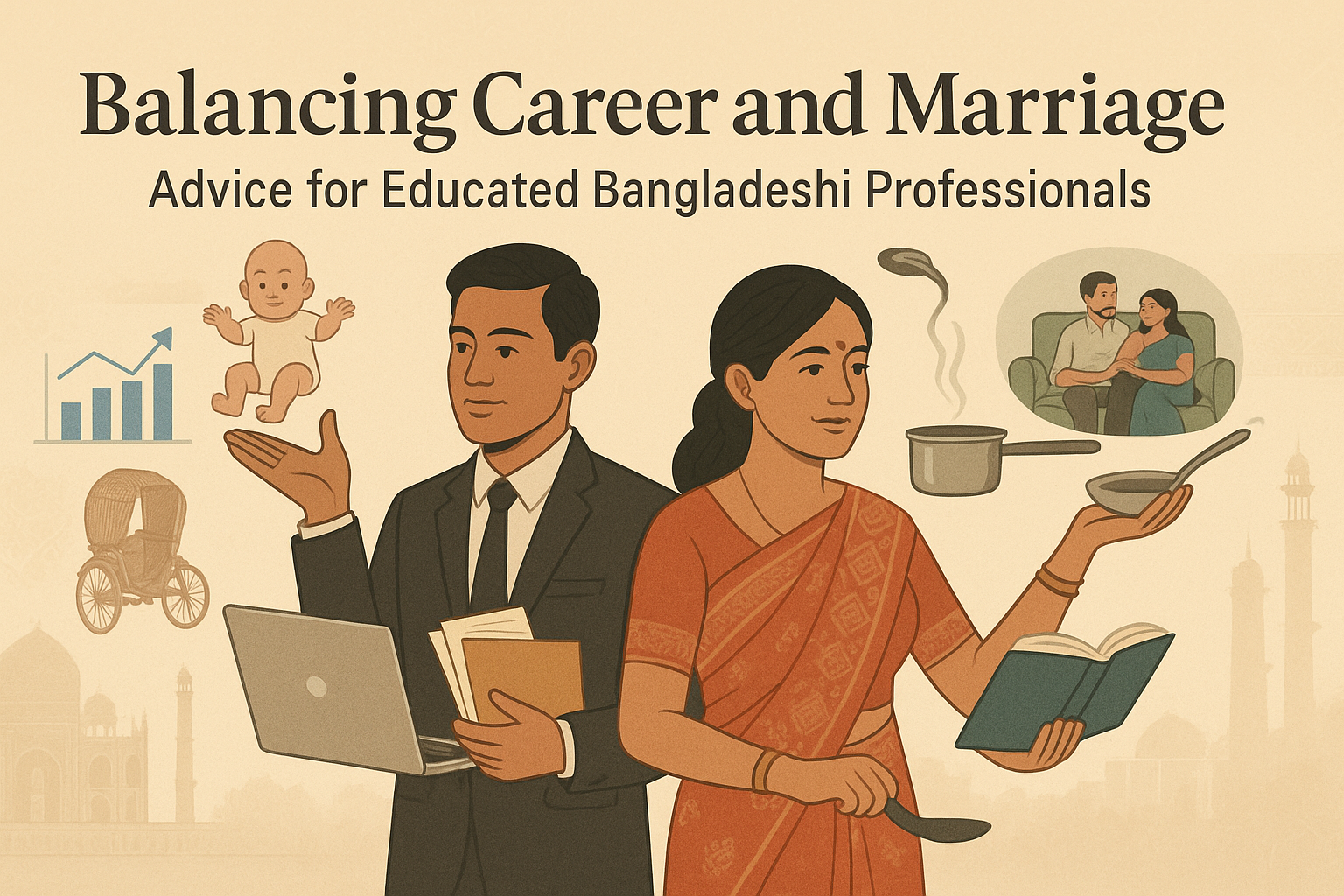
Balancing Career and Marriage: Advice for Educated Bangladeshi Professionals
Introduction
Meet Mr. Ahmed. By day, he’s a senior manager in Gulshan
navigating KPI dashboards; by night, he’s navigating the equally mysterious
world of dinner expectations and Netflix compromise episodes with his wife. If
you're laughing nervously, you're probably living the same plot.
In today's Bangladesh, where both partners often boast
degrees, deadlines, and dinner plans, balancing career and marriage has evolved
into an art—and sometimes a circus act. So how can one juggle ambition and
affection without dropping the proverbial balls?
Let’s break it down—wittily but wisely.
The Bangladeshi Context: Why Balance Matters
Gone are the days when only one spouse brought home the
rice. Today, dual-career couples are the norm in many educated urban
circles—from Dhanmondi to Uttara. The percentage of Bangladeshi women
participating in the workforce is steadily rising, and along with it comes a
cultural shift in expectations.
Yet, with increased opportunity comes increased tension. The
traditional “you handle work, I handle home” model is being challenged. Today’s
couples face modern problems: time crunches, digital distractions, and the
occasional in-law advisory committee on “how it should be done.”
Common Challenges Faced
1. Work-to-Family Conflict
Long work hours and Dhaka’s traffic (which deserves its own
tragic opera) often mean couples return home exhausted. This affects quality
time, communication, and who’s doing the dishes.
2. Family-to-Work Conflict
From childcare emergencies to last-minute in-law visits,
personal life can unexpectedly crash your morning Zoom call.
3. Unequal Household Labour
Despite both partners working full-time, household tasks
often skew disproportionately. And no, applauding someone for "helping
with the kids" is not equality.
4. Emotional and Mental Burnout
Managing two careers and one relationship—sometimes with
extended family stakeholders—can lead to exhaustion. That’s when
misunderstandings pile up faster than weekend laundry.
Smart Strategies for Career‑Savvy Couples
3.1 Set Boundaries Like a Boss
Define “no work” zones—such as post-dinner hours or Sundays.
Put phones down, pick a show (yes, even if it’s her Korean drama or his cricket
reruns). Respect work time and unwind time.
Sync calendars so surprises mean flowers, not forgotten
parent-teacher meetings.
3.2 Share the Load (and the Sponge)
Divide tasks fairly—not necessarily equally. If one cooks,
the other cleans. If she’s prepping a presentation, maybe he handles bedtime
stories. Marriage is a startup; chores are your first investors.
3.3 Communicate, Don’t Assume
Have weekly “relationship stand-up meetings”—it sounds like
a joke, but checking in on feelings, workload, and plans can prevent future
wars.
Use humour, empathy, and the occasional chocolate bribe.
3.4 Protect Your Peace
Self-care isn’t selfish—it’s strategic. Whether it’s
reading, walking, or playing FIFA, both partners need time to recharge.
Emotional intelligence is as crucial at home as it is in boardrooms.
Consider counseling or peer groups if stress piles up.
Strong minds build strong marriages.
3.5 Encourage Flexibility at Work
Negotiate flex hours or WFH options where possible.
Bangladeshi firms are catching on—especially post-pandemic. Advocate for
parental leave, family support, and mental health days.
Remember: happy employees = productive employees.
Real‑Life Success Story
Take “Dr. Rahman” (a pediatrician) and “Ms. Karim” (a
fintech manager). With a toddler at home and demanding careers, they created a
system: alternate evening duties, sync their holidays, and religiously do a
monthly “us-time” dinner—no phones, just food and laughs.
Do they slip up? Of course. But what matters is intention,
teamwork, and the occasional coffee-fueled apology.
Conclusion
Balancing career and marriage isn’t about perfection; it’s
about partnership. Educated Bangladeshi professionals are redefining what
modern relationships look like—moving from rigid roles to dynamic teamwork.
So embrace the chaos with humour, communicate clearly, plan
proactively, and most importantly—support each other’s dreams, not just dinner.
Because when two driven people join forces, it’s not just a
marriage—it’s a power duo.
FAQs
1. How can we manage dual-career work-life balance in
Bangladesh?
By syncing schedules, dividing tasks fairly, communicating
openly, and setting digital boundaries.
2. What if we face resistance from extended family or
in-laws?
Set respectful boundaries. Educate and involve them in the
transition instead of enforcing sudden changes.
3. How to divide chores fairly without conflict?
Talk it out. Align based on preferences and energy levels,
not outdated gender norms.
4. What career lanes or industries in Bangladesh offer
flexibility?
Tech, digital marketing, education, and international NGOs
increasingly offer WFH or hybrid models.
5. How to maintain intimacy and connection during busy
weeks?
Small gestures matter—texts, surprise lunch dates, 10-minute
cuddles, shared jokes. Schedule couple time intentionally.